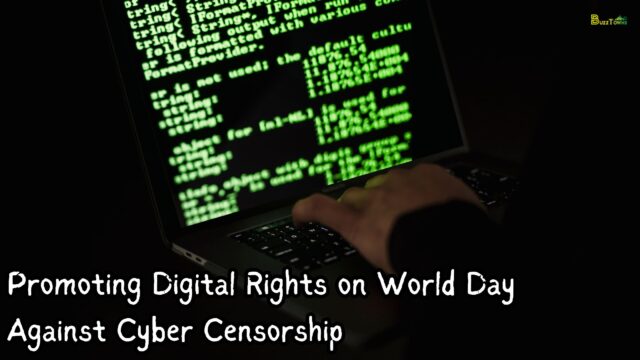Every year, individuals from every corner of the globe unite to observe the World Day Against Cyber Censorship, a momentous occasion marked on March 12th. This significant day stands as a poignant reminder of the indispensable need to maintain the internet as an unfettered and liberated space. It underscores the paramount importance of ensuring that individuals can exercise their fundamental right to privacy without the looming specter of surveillance or censorship casting a shadow over their digital interactions.
Understanding Cyber Censorship
What is Cyber Censorship?
Cyber censorship refers to the blocking or suppression of online content. This phenomenon can take various forms, including corporate surveillance, governmental restrictions, and screening of internet content.
Forms of Cyber Censorship
Cyber censorship can take many different forms, including the manipulation of online information, internet shutdowns, content removal, blocking of websites, and surveillance.
Importance of Digital Rights
In the digital age, digital rights are essential for maintaining online liberties as well as for guaranteeing privacy and independence. They provide people the freedom to express themselves and obtain information without worrying about being watched or censored.
Defining Digital Rights
In the contemporary digital epoch, a realm saturated with intricate networks and labyrinthine algorithms, individuals harbor an inherent entitlement to an array of foundational liberties encapsulated under the umbrella term “digital rights.”
These rights, emblematic of the modern cyber ethos, encompass a multifaceted tapestry of privileges, ranging from the sacrosanct prerogative to online anonymity, unfettered access to a repository of knowledge, the sanctity of personal privacy, to the unfurling of one’s thoughts and opinions with unbridled liberty.
Such entitlements serve as the bedrock upon which the edifice of a democratic cyber society is erected, affording denizens the autonomy to traverse the digital landscape with impunity, shielded by the armor of digital rights from the encroaching tendrils of surveillance and censorship.
Significance in Modern Society
Digital rights are critical to maintaining democracy, encouraging innovation, and advancing social justice in today’s linked society. They provide people the freedom to express themselves, obtain information, and take part in civic life without hindrance or monitoring.
Challenges in Promoting Digital Rights
Digital rights are important, but a number of obstacles prevent them from being promoted and protected.
Governmental Restrictions
In an effort to quell political opposition, manage dissent, and hold onto power, many governments place limitations on internet access and online content. The rights of people to privacy and freedom of expression are frequently violated by these limitations.
Corporate Surveillance
Big tech corporations utilize a lot of surveillance techniques to gather a lot of user data for things like targeted advertising. The ubiquitous monitoring compromises people’s internet privacy and independence.
Online Harassment and Abuse
Online forums can serve as havens for abuse, hate speech, and disinformation, fostering antagonistic atmospheres that stifle the voices of the oppressed and restrict freedom of speech.
Promoting Digital Rights on World Day Against Cyber Censorship
Globally, individuals and entities converge annually for the World Day Against Cyber Censorship, advocating vehemently for digital liberties and rallying against the pervasive threat of online censorship.
Advocacy and Awareness Campaigns
Actors and groups educate the public about the value of digital rights and the dangers of cyber censorship through advocacy campaigns and awareness-raising events.
Education and Empowerment Initiatives
Digital literacy campaigns and educational programs enable people to safeguard their privacy, know their rights online, and use the internet responsibly.
Legislative Efforts
Legislation that protects digital rights, fortifies online privacy measures and makes businesses and governments responsible for infringing upon the online rights of individuals is the goal of advocates.
The Role of Technology in Digital Rights Advocacy
Technology is essential to furthering the cause of digital rights and evading internet restrictions.
Encryption and Privacy Tools
People can safeguard their data, communications, and online activities against monitoring and interception with the use of encryption technologies and privacy-enhancing applications.
Internet Freedom Software
Users of internet freedom software, such as circumvention tools and anonymization services, can access content and websites that are restricted online and get around online censorship.
Examples of Successful Digital Rights Campaigns
Numerous winning efforts for digital rights have brought attention to the significance of safeguarding internet liberty and opposing censorship.
Conclusion
The annual World Day Against Cyber Censorship is an important reminder of the continuous struggle to uphold internet freedom and safeguard digital rights. Together, individuals and groups can push for awareness-raising, education, legislative reform, and technology innovation to build a more inclusive and transparent digital environment.








